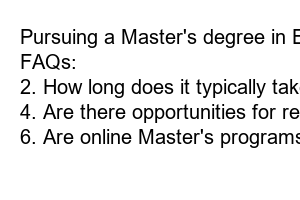스승 찾기
Title: Find a Master in English: Unlocking Doors to Endless Opportunities
Subheadings:
1. Why Pursue a Master’s Degree in English?
2. Where to Find Reputable Master’s Programs in English?
3. Tips for Choosing the Right Master’s Program in English
4. Financing Your Master’s Degree in English
5. How to Apply for a Master’s Program in English
6. Careers and Advancement Opportunities for English Master’s Graduates
7. Summary: Take the Leap and Master Your Future in English
Are you passionate about literature, language, or teaching? A Master’s degree in English can open a world of opportunities and propel your career to new heights. Whether you seek personal growth, professional advancement, or simply a deeper understanding of the written word, finding the right Master’s program in English is crucial. Let’s dive into the journey of finding the perfect program for you!
1. Why Pursue a Master’s Degree in English?
A Master’s degree in English allows you to delve into the intricacies of literature, language, and critical analysis while honing your writing and research skills. It equips you with the expertise to explore diverse fields such as academia, research, publishing, media, and communication. Elevate your intellectual abilities, expand your network, and gain a competitive edge in the job market.
2. Where to Find Reputable Master’s Programs in English?
Finding reputable Master’s programs in English is as easy as a few clicks. **Top universities** worldwide offer comprehensive programs tailored to your specific interests. Explore prestigious institutions such as Harvard, Oxford, Cambridge, or Stanford, or consider online options that provide flexibility while delivering quality education.
3. Tips for Choosing the Right Master’s Program in English
With numerous programs to choose from, it’s crucial to **align your passions** and goals with the available offerings. Consider the focus areas, course curriculum, faculty credentials, and research opportunities. Assess the program’s flexibility, location, and potential for internships or practical experience. Collaborative learning environments and extracurricular opportunities can enhance your overall experience.
4. Financing Your Master’s Degree in English
Investing in your education is an investment in yourself. Finances can be a concern for many students, but various options exist to ease the burden. Research scholarships, grants, work-study programs, and assistantships offered by universities, private organizations, or government agencies. Consider part-time or online options to balance your studies with work.
5. How to Apply for a Master’s Program in English
To embark on this exciting academic journey, you’ll need to prepare a stellar application package. Start by gathering your undergraduate transcripts, letters of recommendation, a well-articulated statement of purpose, and a writing sample showcasing your skills. Be sure to adhere to deadlines and follow each institution’s application process meticulously.
6. Careers and Advancement Opportunities for English Master’s Graduates
The versatility of a Master’s degree in English opens doors to a wide range of careers. Seize opportunities in academia as a professor or researcher, explore publishing as an editor or literary agent, or dive into the world of media and communication. The critical thinking, writing, and analytical skills you acquire during your Master’s studies provide a strong foundation for success.
Summary: Take the Leap and Master Your Future in English
Pursuing a Master’s degree in English is an exciting and rewarding endeavor. Explore reputable institutions, weigh your options carefully, and align your passions with programs that ignite your curiosity. Take advantage of financial aid resources, put together an outstanding application package, and chart a path to a vibrant career in literature, language, or education. Unlock your true potential, broaden your horizons, and make your mark in the world of English studies.
FAQs:
1. Can I pursue a Master’s degree in English without an undergraduate degree in the same field?
2. How long does it typically take to complete a Master’s program in English?
3. Is it necessary to know a foreign language to excel in an English Master’s program?
4. Are there opportunities for research or academic publications during a Master’s program in English?
5. Can a Master’s degree in English lead to higher salary prospects?
6. Are online Master’s programs in English considered equally reputable as traditional on-campus programs?

